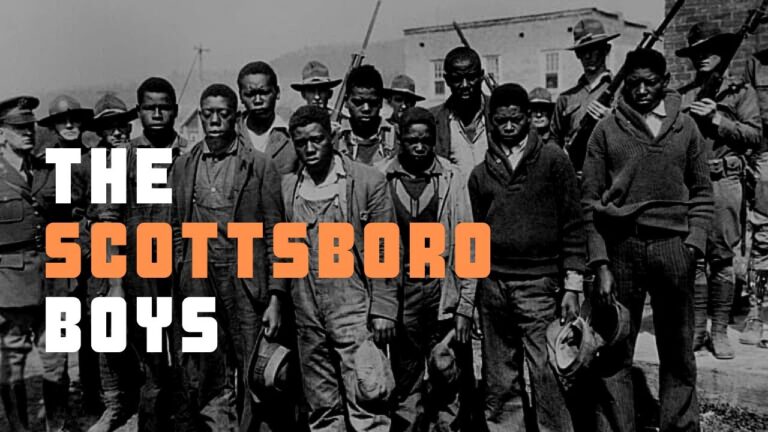
Page Description
Explore the Scottsboro Boys case and
the civil rights injustice they faced.
Discover its landmark impact on American history.
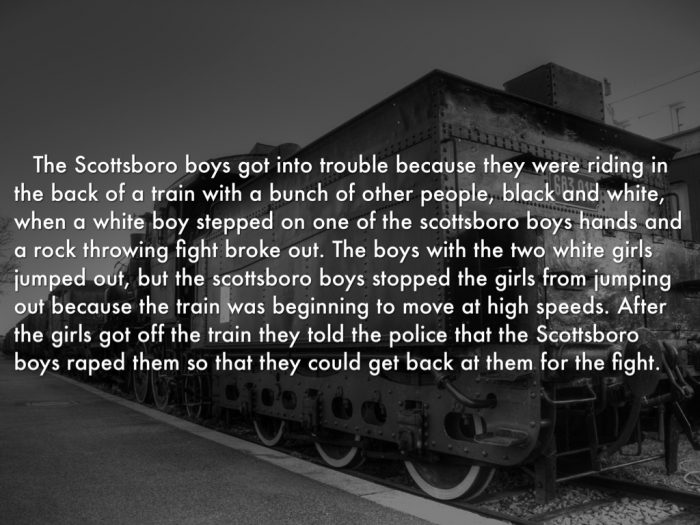
The hidden history of the quest for civil rights
The Scottsboro Boys were nine African American teenage boys who were accused of raping two white women in Alabama back in 1931. This event led to a series of significant legal battles that highlighted issues of racism and the right to a fair trial. These cases involved horrifying instances such as a lynch mob forming before the suspects were even formally charged, all-white juries, rushed trials, and chaotic mobs causing disruptions. Many people point to this as a clear example of injustice within the United States legal system.
De Scottsboro Boys waren negen Afro-Amerikaanse tienerjongens die in 1931 in Alabama beschuldigd werden van het verkrachten van twee blanke vrouwen. Dit incident leidde tot een reeks belangrijke juridische gevechten die racisme en het recht op een eerlijk proces aan de kaak stelden. De zaken omvatten afschuwelijke gebeurtenissen zoals een lynchmenigte die zich vormde voordat de verdachten zelfs formeel waren aangeklaagd, volledig blanke jury’s, haastige processen en chaotische menigten die voor onrust zorgden. Velen wijzen hierop als een duidelijk voorbeeld van onrecht binnen het juridische systeem van de Verenigde Staten.
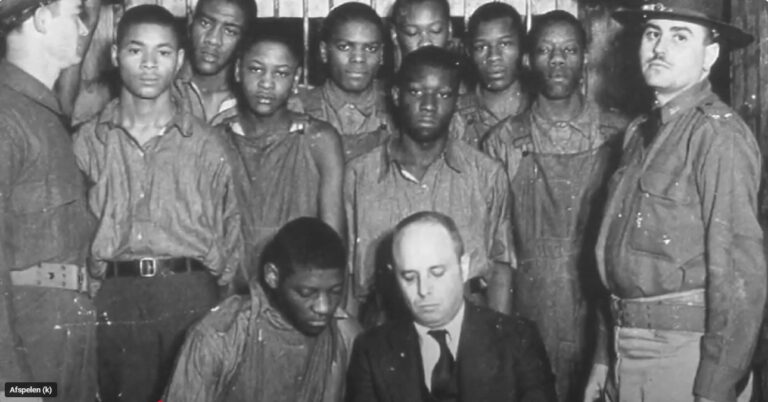
1 The Scottsboro Boys
13 feb. 2012
Educational: This video is essential viewing
Educational: This video is essential viewing
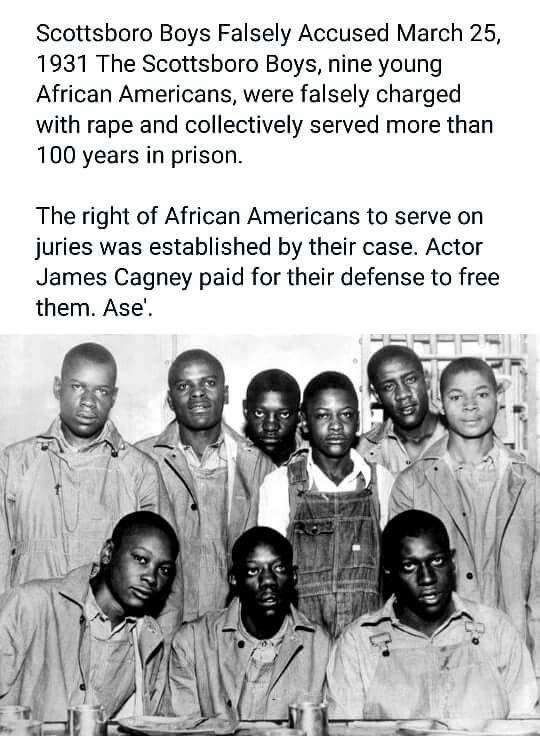
3 – 2 White Women Ruined The Lives Of These Young Black Men (THEY LIED)
19 jul 2023 Black History
2 White Women Ruined The Lives Of These Young Black Men (THEY LIED)
No other case on American soil – let alone a crime that never happened – has led to as many appeals, trials, and re-trials as the Scottsboro Boys case. The nine young black teenagers from Alabama had their lives ruined after getting accused of r*ping two white women near Scottsboro. The case marked a turning point in the civil rights movement. Despite strong evidence supporting their innocence, all-white juries found eight of the nine defendants guilty and sentenced them to d**th by electric chair, causing national outrage. Here is what happened to the Scottsboro Boys.
Black Culture Unlocked is a movement focused on bringing the raw truth and real history to the culture. Our mission is to write our own stories and unlock the minds of the culture to become free thinkers. Subscribe and turn on post notifications to join the movement!
7 apr 2022
In the first of the series, “Cases in Brief,” Harvard Law Professor Dehlia Umunna discusses the infamous “Scottsboro Boys” case, Powell v. Alabama (1932), in which the U.S. Supreme Court ruled for the first time that defendants in capital cases have the right to adequate legal counsel under the 14th Amendment, which grants all U.S. citizens “equal protection of the laws.”
The case involved a group of nine young Black men who were falsely accused of raping two white women aboard a train near Scottsboro, Alabama. Lacking adequate counsel, they were hastily tried and convicted — multiple times — by all-white juries, but the convictions were twice overturned by the Court. Here, Umunna, who is herself a former public defender, sheds light on the historical context surrounding the convictions, explains the constitutional underpinnings of the Supreme Court’s decisions, and highlights the continuing importance of having public defenders in the U.S. justice system.
Educational: This video is essential viewing
Educational: This video is essential viewing
Britannica
Scottsboro case, major U.S. civil rights controversy of the 1930s surrounding the prosecution in Scottsboro, Alabama, of nine black youths charged with the rape of two white women. The nine, after nearly being lynched, were brought to trial in Scottsboro in April 1931, just three weeks after their arrests. Not until the first day of the trial were the defendants provided with the services of two volunteer lawyers.
Despite testimony by doctors who had examined the women that no rape had occurred, the all-white jury convicted the nine, and all but the youngest, who was 12 years old, were sentenced to death. The announcement of the verdict and sentences brought a storm of charges from outside the South that a gross miscarriage of justice had occurred in Scottsboro. The cause of the “Scottsboro Boys” was championed, and in some cases exploited, by Northern liberal and radical groups, notably the Communist Party of the U.S.A.
In 1932 the U.S. Supreme Court overturned the convictions (Powell v. Alabama) on the grounds that the defendants had not received adequate legal counsel in a capital case. The state of Alabama then retried one of the accused and again convicted him. In a 1935 decision (Norris v. Alabama), the U.S. Supreme Court overturned this conviction, ruling that the state had systematically excluded blacks from juries.
Alabama again tried and convicted another of the group, Haywood Patterson, this time sentencing him to 75 years in prison. Further trials of the rest of the defendants resulted in more reconvictions and successful appeals until, after persistent pressure from citizens’ groups, the state freed the four youngest (who had already served six years in jail) and later paroled Charles Weems, Andy Wright, and Clarence Norris. Patterson, however, had escaped in 1948 and fled to Michigan, where, three years later, he was convicted of manslaughter in the stabbing death of another black. He died in prison.
The last known surviving member of the group, Norris, who had fled to the North after his parole in 1946, was granted a full pardon by the governor of Alabama in 1976. Patterson, Weems, and Wright were pardoned by the state in 2013.
This article was most recently revised and updated by Amy Tikkanen.
Scottsboro case
law case
Written and fact-checked by
Last Updated: Article History
A poster advertising a protest on behalf of the “Scottsboro Boys,” 1931.
Scottsboro case
Location: Alabama Scottsboro United States
Key People: Arthur Garfield Hays
5 The Spectacle Lynching of Claude Neal
13 feb. 2012
Claude Neal was the last “spectacle lynching” in the United States. Although spectacle and lynching are words that don’t go together in this case they did. Emory’s Associate Professor of African American Studies, Carol Anderson, takes you through what justice looked like for Claude Neal.
6 Wrongfully Convicted 3312: The Scottsboro Boys
1 dec. 2016
Educational: This video is essential viewing
Educational: This video is essential viewing
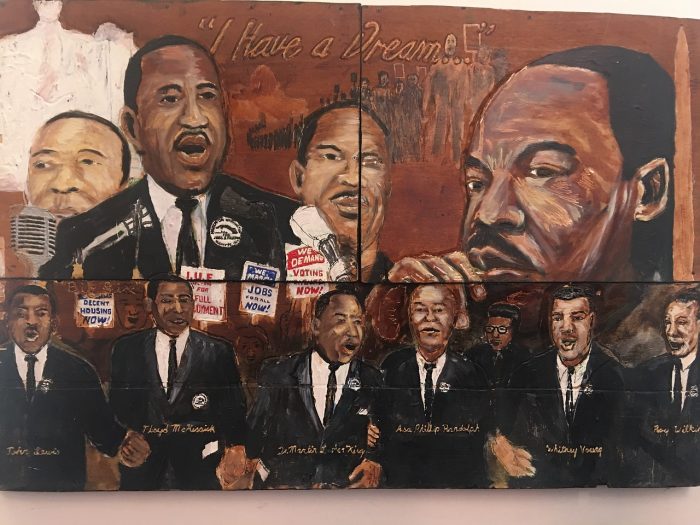
7 Scottsboro Documentary
Back to menu IMPORTANT CONTENT Listening recommended Must
5 apr. 2016
8 Another Wicked Act Hidden from History Books
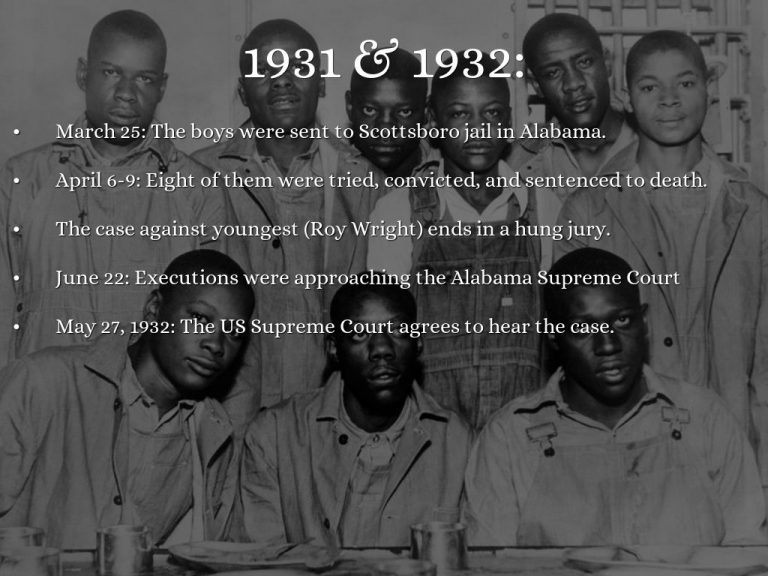
9 Fla. Lawmakers Apologize to Family of “Groveland Four,” Black Men Falsely Accused of Rape in 1949
4 mei 2017
Educational: This video is essential viewing
The Scottsboro Boys were a group of nine African American teenagers who were wrongfully convicted of raping two white women on a train in Alabama in 1931. The case was marked by racial prejudice, miscarriage of justice, and violation of civil rights. Some of the key points about the wrongful conviction of the Scottsboro Boys are:
False Accusations: The Scottsboro Boys were accused of raping two white women, Victoria Price and Ruby Bates, who were also on the train. However, there was no credible evidence or witnesses to support the accusations, and the women later recanted their testimony, admitting that they had fabricated the story.
Racial Prejudice: The convictions of the Scottsboro Boys were influenced by deep-seated racial prejudice prevalent in the South during that time. The accused teenagers were African American, while the alleged victims were white, and an all-white jury was biased against them based on their race.
Lack of Due Process: The Scottsboro Boys were denied basic legal rights and due process during their trials. They were not provided with adequate legal representation, and their defense was weak. They were also subjected to harsh treatment, including violence and threats, by law enforcement officials and prison authorities.
Unfair Trials: The trials of the Scottsboro Boys were conducted hastily, with flawed procedures and irregularities. The accused teenagers were not given a fair and impartial trial, and the verdicts were predetermined due to racial bias.
Inadequate Appeals: The Scottsboro Boys’ appeals were also hindered by racial prejudice and legal barriers. Despite evidence of their innocence, their appeals were repeatedly denied by higher courts, and they were kept in jail for many years.
Impact on Civil Rights Movement: The wrongful conviction of the Scottsboro Boys became a symbol of racial injustice and galvanized the civil rights movement in the United States. The case brought attention to the systemic racism and discrimination faced by African Americans in the criminal justice system and inspired efforts for social change.
Exonerations: Over time, some of the Scottsboro Boys were released or had their convictions overturned, but it took decades for all of them to be exonerated. The last surviving member of the group, Clarence Norris, was pardoned in 1976, more than 45 years after the false accusations and wrongful convictions.
Historical Significance: The Scottsboro Boys case has become a landmark in American legal history, highlighting the injustices faced by marginalized communities in the criminal justice system. It led to important legal reforms and precedents, including the recognition of the right to effective legal representation and the prohibition of racial discrimination in jury selection.
Lessons Learned: The wrongful conviction of the Scottsboro Boys serves as a poignant reminder of the dangers of racial prejudice, lack of due process, and flaws in the criminal justice system. It underscores the need for vigilance in protecting civil rights, upholding the presumption of innocence, and ensuring fair and equitable treatment for all individuals, regardless of their race or background.
11 A Dark Chapter In American History That Must Never Be Forgotten | Black Culture
Back to menu IMPORTANT CONTENT
5 mei 2023 #BlackHistory #BlackCulture #BlackLiterature
Over the course of the two decades that followed, the struggle for justice of the “Scottsboro Boys,” as the black teens were called, made celebrities out of anonymities, launched and ended careers, wasted lives, produced heroes, opened southern juries to blacks, exacerbated sectional strife, and divided America’s political left.
This video is about a story that is often overlooked in history books, but it is one that is both heartbreaking and inspiring. This is the story of Scottsboro Boys.
On March 25, 1931, nine African American teenagers were accused of raping two white women aboard a Southern Railroad freight train in northern Alabama. Haywood Patterson, Olen Montgomery, Clarence Norris, Willie Roberson, Andy Wright, Ozzie Powell, Eugene Williams, Charley Weems and Roy Wright were searching for work when a racially-charged fight broke out between passengers. The fight is said to have started when a young white man stepped on the hand of one of the Scottsboro Boys.
The young white men who were fighting were forced to exit the train. Enraged, they conjured a story of how the black men were at fault for the incident. By the time the train reached Paint Rock, Alabama, the Scottsboro Boys were met with an angry mob and charged with assault. Victoria Price and Ruby Bates, two white women who were also riding the freight train, faced charges of vagrancy and illegal sexual activity. In order to avoid these charges, they falsely accused the Scottsboro Boys of rape.
Only four of the young African American teen knew each other prior to the incident on the freight train. The teens ranged in age from 13 to 19. None were Alabamans; they were from Georgia and Tennessee. They were heading to towns to seek work with decent wages. Two of them, Andrew and Leroy Wright, were brothers.
They had not been to Scottsboro or were even born there, but as the trials drew increasing regional and national attention they became known as the Scottsboro Boys.
Welcome to Black Journals, a channel dedicated to exploring and sharing the rich history, literature, and culture of the African American community. Our channel takes a deep dive into the pages of black journals and uncovers the hidden stories and untold truths of the black experience.
From the harrowing legacy of the Atlantic slave trade to the powerful impact of black literature and the black narrative, we shine a light on the unwritten history and the stories that have been overlooked or suppressed. We celebrate the black legacy and the resilience of the African diaspora, as well as the activism and political history of African Americans in their ongoing fight for justice and equality.
Our channel also explores the beauty and creativity of black art, literature, and culture, offering a platform for African American voices and perspectives to be heard and appreciated. Come along with us as we turn the pages of black journals and uncover the pages of Black Pages of History.
If you like
12 Scottsboro Black civil rights cases Documentary
9 apr 2025
Dive into the landmark Scottsboro Boys case in our compelling documentary, exploration uncovers the critical legal and social issues of the 1930s, showcasing the unjust accusations, trials, and the Supreme Court’s pivotal intervention. Through powerful storytelling, archival footage, and expert interviews.We tackle themes of racial discrimination and the denial of legal representation, revealing the lasting implications for civil rights today. Experience the historical context with high-contrast visuals and bold subtitles that emphasize the struggle for justice and equality. Join us in reflecting on how the past resonates within contemporary society.
If you find this content impactful, please like and share!
Scottsboro Black civil rights cases Documentary
4 jan 2022
The Scottsboro Boys case was among the most important civil rights cases in the history of American jurisprudence. It was twice appealed to the United States Supreme Court and established the principles that, in the United States, criminal defendants are entitled to effective assistance of counsel[14] and that people may not be de facto excluded from juries due to their race.[15]
In 1931 nine black youths, ranging in age from twelve to twenty, were accused in Scottsboro of raping two white women, Victoria Price and Ruby Bates, one of whom would later recant her accusation. The victims and accused alike had all hitched rides on a passing train on the Southern Railroad freight route from Chattanooga to Memphis on March 25, 1931. It happened to stop in Jackson County, Alabama where these women made their accusations to local officials against these black youths.[16] The defendants were brought to Scottsboro for trial because it was the seat of Jackson County.[17]
13 Guilty Until Proven Innocent | The Scottsboro Boys Cases
14 The Scottsboro Boys Revisited
15 – 3767 17 The Trials of the “Scottsboro Boys” The Great Trials of World History and the Lessons Th
16 Scottsboro: An American Tragedy (Overview of the 1931 Incident & Initial Trial)
Highly Recommended Viewing
This 33-minute video offers a powerful and detailed account of the Scottsboro Boys trials — a pivotal case in American legal history that exposes deep injustices and racial prejudice. Its high-quality narration and insightful analysis make it essential for anyone interested in justice, truth, and historical accountability. Watching and listening is strongly advised.
Educational: This video is essential viewing
Educational: This video is essential viewing
17 “The Scottsboro Boys”: A History Not Forgotten by Tony Voters
Back to menu IMPORTANT CONTENT Listening recommended Must
13 mei 2011
http://www.playbill.com/video Susan Stroman (Tony nominee for Best Direction of a Musical and Best Choreography) joins fellow Tony nominees Colman Domingo, Forrest McClendon (both nominated for Best Featured Actor in a Musical) and Joshua Henry (Best Actor in a Musical) to talk about their passion for the “The Scottsboro Boys”, the mission of the show and passing history lessons along.
The Untold Story of the Scottsboro Boys and the Fight for Justice
3 jun 2023
Injustice Uncovered: The Scottsboro Boys and Their Long Path to Redemption is a heart-wrenching and thought-provoking video that sheds light on the little-known story of the Scottsboro Boys. In the 1930s, nine African American young men were falsely accused of raping two white women in Alabama. The Scottsboro Boys were tried and re-tried, often without proper legal representation, and were ultimately sentenced to death. This video explores the harrowing journey of these individuals as they fought for justice in a society plagued by racism and prejudice.
Through interviews with experts and activists, archival footage, and dramatic reenactments, Injustice Uncovered highlights the injustices and systemic racism that these young men faced. Despite their innocence being proven, the Scottsboro Boys spent years in prison and faced a multitude of legal battles before finally being exonerated.
This video offers an important historical perspective on how our justice system has failed African American communities throughout history. It also serves as a reminder to continue fighting for systemic change and equality for all.
If you are interested in social justice, American history, or simply want to learn more about the Scottsboro Boys and their fight for redemption, this video is a must-watch. Join us in uncovering this untold story and shedding light on the importance of justice and equality.
18 The INJUSTICE of The Scottsboro 9 (The Trial of The Scottsboro Boys)
Back to menu IMPORTANT CONTENT Listening recommended Must ***
21 sep 2021 One Mic History (Video Podcast)
A explanation of the story and trial of the Scottsboro Boys.
Who were the Scottsboro 9 and what happened to them? The Scottsboro Boys were nine black teenagers falsely accused of raping two white women aboard a train near Scottsboro, Alabama, in 1931. The trials and repeated retrials of the Scottsboro Boys sparked an international uproar and produced two landmark U.S. Supreme Court verdicts and their injustice during their trial lead to several legal reforms.
19 An American Tragedy: The Scottsboro Boys’ Trial
20 Judge Horton and the Scottsboro Boys (1976)
PLEASE NOTE: This film contains moments of strong language and subject matter that some viewers may find offensive. Comments have been set to “pending approval” (offensive comments will not be approved). Also, a message will appear across the film at 22:21, 51:56 and 1:14:43 to let viewers know that it was uploaded on the “Manfocused” channel. SYNOPSIS: This made-for-TV movie chronicles the famous 1931 trial of nine young black boys who were accused of gang-raping two white women in Scottsboro, Ala. An all-white jury finds eight of the nine boys guilty and sentence them to death. But when the Supreme Court rejects the decision, the case is sent back to Alabama where it is retried under Judge Horton (Arthur Hill). Despite the details exonerating the boys, neither the community nor the jury is willing to find the boys innocent, obliging Horton to insist upon additional trials at the expense of his reputation.
21 Scottsboro Boys: 1931 Racism in Due Process Overdue for Supreme Court Change
Back to menu IMPORTANT CONTENT Listening recommended Must
Daily Dose Documentary
17 jul 2023
The Daily Dose provides microlearning history documentaries like this one delivered to your inbox daily: https://dailydosedocumentary.com
We strive for accuracy and unbiased fairness, but if you spot something that doesn’t look right please submit a correction suggestion here
22 Gov. Ivey marks 92 years since Scottsboro Boys decision
The community of Scottsboro gathered at the newly-renovated museum dedicated to the important civil rights case.
23 Small Town Horror Story: The Framing of the Scottsboro Boys
24 Scottsboro Boys: a Pardon Decades in the Making
19 mrt 2013
The Alabama Legislature has taken major steps toward clearing the names of the Scottsboro Boys, more than 80 years after the young black men were convicted by all-white juries of raping two white women. (March 19)
25 Revisiting the Scottsboro Boys
26 Scottsboro Boys Museum Reopens
10 nov 2022
After a long wait, the “Scottsboro Boys” museum is now officially back open.
News 19 is North Alabama’s News Leader! We are the CBS affiliate in North Alabama and the Tennessee Valley since November 28, 1963.
27 Scottsboro Boys (1931 & 1935) – Good summery
Back to menu IMPORTANT CONTENT Listening recommended Must
11 feb 2023
In 1931, nine Black teenagers were accused of raping two white women while train hopping in Tennessee. Despite their young ages, ranging from 13 to 20, all but one were convicted of rape and sentenced to death in rushed trials held in Scottsboro, Alabama. With the help of groups like the NAACP, the case was appealed to the Supreme Court, where the Powell v. Alabama decision in 1932 ordered new trials for the Scottsboro nine. The case highlighted the injustice of the legal system towards Black Americans, who were often tried by all-white juries and sentenced with little or no evidence.
28 The Story Of The Scottsboro Boys
9 apr 2022
Teacher | Father | Activist | Content Creator
______________________________
This page was created to Teach Black History! Unfortunately, the American Educational System was designed to exclude our real Historical account so we are here to dismantle it! It’s time to enlighten those of us who have been kept in the dark! I am a black man who didn’t know enough about my own history, so I began to dig deeper and do my own research! Black history is American History so I want people of all Races and Cultures to join together to learn our History as one! Here, I will share all of my findings!
32 Son of Scottsboro Boy Speaks Out on The Scottsboro Boys’ Pardon & Exoneration 4/19/2013
2.319 weergaven 5 mei 2013
“Never Too Late For Justice: Bro. Clarence Norris Jr., son of Scottsboro Boy Clarence Norris Sr., Speaks Out on The Scottsboro Boys’ Pardon and Exoneration…”
4/19/2013
“The Scottsboro Boys’ Case”
In 1931, nine black youths ages 13 to 19
were pulled from a train in Paint Rock,
Alabama, arrested and
taken to nearby Scottsboro, Alabama,
where they were jailed, tried and
declared guilty of raping two white
women — a crime that never occurred.
All-white male juries quickly sentenced
eight to death. A long-term and
ultimately successful campaign to save
the youths’ lives and, in time, exonerate
them led to one of the most dramatic
and revealing civil rights struggles in
U.S. history.
“Legal Precedents”
The Scottsboro Boys’ case is recognized internationally
as one of the most infamous in legal history. The U.S.
Supreme Court twice heard arguments in the case,
leading to two landmark civil-rights precedents
regarding:
The right to counsel – The Court ruled the defendants
were denied the right to effective counsel in their first
trial when the judge named all members of the Jackson
County bar to defend them, effectively diffusing final
responsibility for their case. (Patterson vs. Alabama,
1932)
Nondiscrimination in juror rolls – Because Jackson
County juror rolls excluded blacks, the Court ruled the
defendants had not received equal protection under the
law. (Norris vs. Alabama, 1935)
Support The W.E. A.L.L B.E.
Movement!!!
Donate online:
http://bit.ly/VfaE1N
Or send a money order to
the following address:
Attn: Ron Herd II
The W.E. A.L.L. B.E. Group
Inc.
P.O. Box 752062
Memphis, TN 38175
33 Remembering The Scottsboro Boys | March 24, 2023 | News 19 at 6 p.m.
Back to menu IMPORTANT CONTENT Listening recommended Must
25 mrt 2023
State leaders commemorated the 92nd anniversary of the arrest of The Scottsboro Boys on Friday.
News 19 is North Alabama’s News Leader! We are the CBS affiliate in North Alabama and the Tennessee Valley since November 28, 1963.
34 The Scottsboro 9, the NAACP and The Communist Party USA
Live gestreamd op 18 jun 2021
This LIVE Presentation and Q&A will immediately follow my live premier How The Great Depression Affected Black Women…And What Black Women Did About It (be sure to check out the premier at 6pm here
In Scottsboro, Alabama nine Black teenagers were falsely accused and convicted of rape in 1931. The Scottsboro Boys. In a trial that lasted less than two days, the all-white jury took just over an hour to deliberate and find them guilty. Although the case is a major landmark in the history of the American civil rights movement, the NAACP was tepid in its involvement. The Communist Party USA (CPUSA), however, was quick to respond, and within a few weeks had secured legal counsel for the accused.
In this live stream, I’ll discuss why the CPUSA was uniquely situated to jump in where the NAACP dared not tread. I’ll also discuss how the case changed the landscape of the South making future Civil Rights victories possible.
35 The Racist Origins of U.S. Law
6 aug 2020 History of… Race & Ethnicity
PBS Member Stations rely on viewers like you. To support your local station, go to
Laws are intended to maintain order and promote justice, but what happens when those laws promote and spread discrimination and bigotry? Today Danielle analyzes the discriminatory history US law, tracing its origins in colonialism and chattel slavery up through the Jim Crow era and today’s mass incarceration.
Special thanks to our Historians Harry Brisson and
Melanie-Antonietta Brown and Archivist Rachel Brice on Patreon!
36 Guilty Until Proven Innocent | The Scottsboro Boys Cases
24 mei 2019
I wrote a new book all about the Supreme Court. Order your copy here: http://amzn.to/45Wzhur or visit https://www.iammrbeat.com/merch.html.
My Ampeduplearning store: https://ampeduplearning.com/teacher-c…
My Discord server:
/ discord
In episode 47 of Supreme Court Briefs, it’s the story of the Scottsboro Boys, the nine African American teenage boys who were falsely accused of raping two white women.
37 Scottsboro Boys and the Communist Party
Professor Clarence Taylor of Baruch College discusses the American Communist Party and its part in providing legal representation to the Scottsboro Boys, a group of nine young African American men who were accused of raping two white women in 1931.
38 The Racial INJUSTICE of The Scottsboro Boys #blackhistory
21 sep 2021 One Mic History (Video Podcast)
A explanation of the story and trial of the Scottsboro Boys.
Who were the Scottsboro 9 and what happened to them? The Scottsboro Boys were nine black teenagers falsely accused of raping two white women aboard a train near Scottsboro, Alabama, in 1931. The trials and repeated retrials of the Scottsboro Boys sparked an international uproar and produced two landmark U.S. Supreme Court verdicts and their injustice during their trial lead to several legal reforms.
39 🏡 Scottsboro Alabama 🏡… the most beautiful city in Northern Alabama but 🤔
40 Scottsboro to Today. Continuing Their Story.
40 Shocking Truth About The Scottsboro Boys Unveiled
7 okt 2024 #Africanhistory #BlackHistory #BlackCulture
👉 Tired of spending hours crafting engaging video scripts? Wish creating quality content was quicker and easier?
The Scottsboro Boys: When Justice Was a Lie
The case of the Scottsboro Boys reveals one of the darkest chapters in American legal history. In 1931, nine Black teenagers were falsely accused of raping two white women on a train in Alabama. Despite a complete lack of evidence and one accuser later recanting her testimony, the young men were swiftly convicted by all-white juries in deeply biased trials. This video exposes the shocking truth behind the case — a tragic example of systemic racism, wrongful conviction, and the long fight for justice. It reminds us how quickly justice can be distorted when prejudice replaces truth.
De Scottsboro Boys: Wanneer Justitie een Leugen Was
De zaak van de Scottsboro Boys onthult een van de donkerste hoofdstukken in de Amerikaanse rechtsgeschiedenis. In 1931 werden negen zwarte tieners vals beschuldigd van de verkrachting van twee witte vrouwen op een trein in Alabama. Ondanks het totale gebrek aan bewijs — en het feit dat een van de vrouwen haar verklaring later introk — werden de jongens razendsnel veroordeeld door volledig witte jury’s in sterk bevooroordeelde rechtszaken. Deze video legt de schokkende waarheid achter de zaak bloot: een tragisch voorbeeld van systematisch racisme, onterechte veroordeling en een langdurige strijd voor gerechtigheid. Het herinnert ons eraan hoe snel recht kan vervormen wanneer vooroordeel de plaats van waarheid inneemt.
Educational: This video is essential viewing
41 Funny Pinching Lobster Gag
13 mei 2011